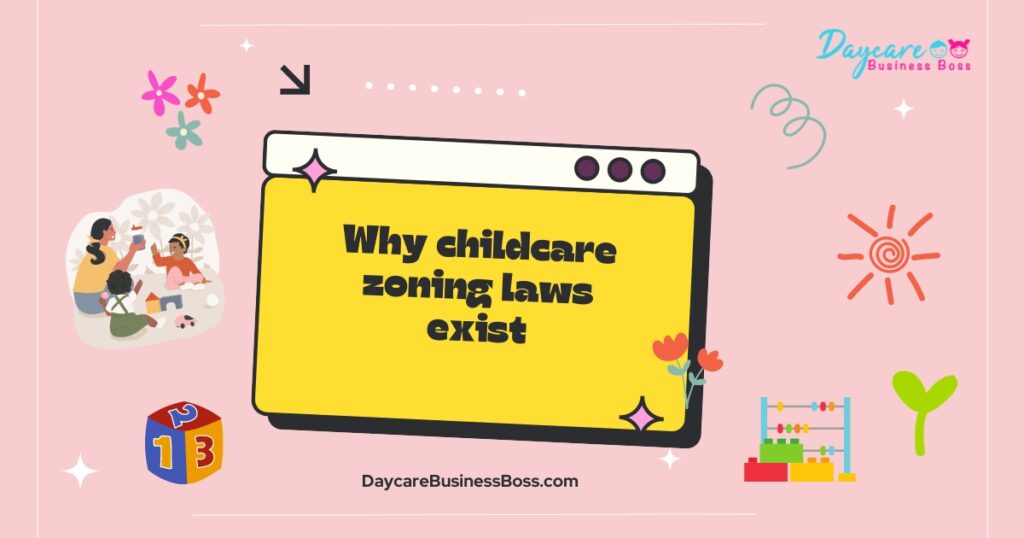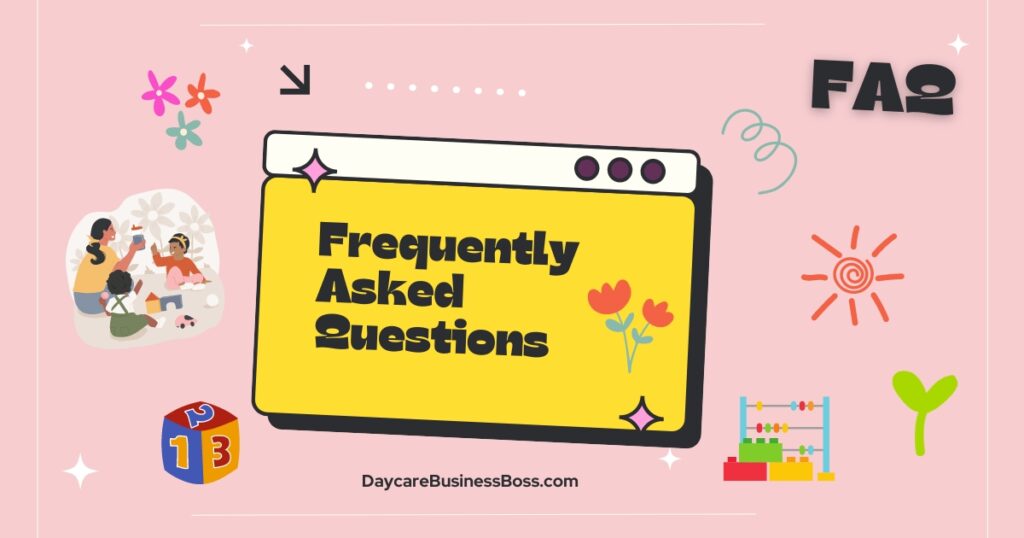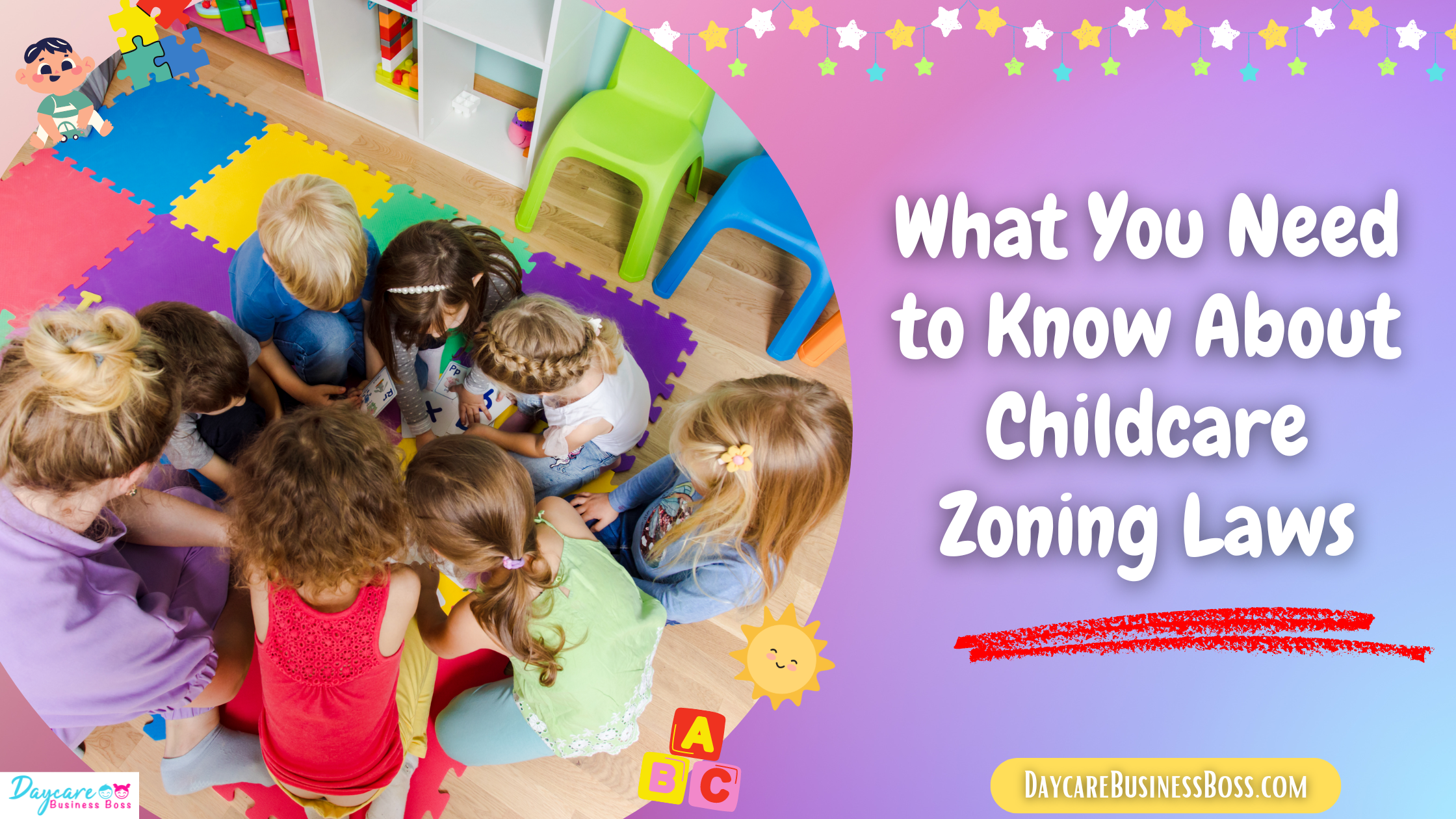Opening a daycare is a rewarding experience, but it can be quite complicated. What often causes trouble for those who are opening daycare centers are childcare zoning laws. Thankfully, we are going to look at everything you need to know about childcare zoning laws.
-
- What are childcare zoning laws?
- Why childcare zoning laws exist
- How zoning laws work
- Finding information on your local zoning laws
What are childcare zoning laws?
Zoning laws or more properly known as zoning ordinances are written laws that provide the specifications for the use of different real estate in different zoning districts.
In essence, zoning laws specify what residential buildings in the area or “zone” that the law presides over can be used for.
While there are general zoning laws that exist in nearly every county across the United States, most counties either have separate zoning laws for childcare services or simply have these restrictions written into their general zoning laws.
What kind of restrictions do childcare zoning laws provide?
Although childcare zoning laws will likely differ in each state and county, there are a few restrictions that childcare zoning laws provide universally no matter where you are.
For one, childcare zoning laws generally put restrictions on the number of children that can be cared for in a single residential daycare center at a single time.
For example, the magic number for many zoning laws is 10, which means that a residential childcare center can care for 10 children at one time.
If a residential childcare center was to care for any more than 10 children at one time, they would be breaking the zoning laws and will likely incur a fine.
It is also common for childcare zoning laws to restrict the times at which a residential childcare center can operate.
This will vary more than some of the other restrictions, but the most common time restriction is most often around 8 AM to 6 PM.
A much rarer but still encounterable restriction that some zoning laws dictate is the number of children that a residential daycare can care for who are under the age of 10.
These are just a few of the most common restrictions that some zoning laws will place on residential daycare centers.
However, if you would like to know the full list for your area, the best way to do so is to get the information on the zoning laws in your area, a process we will be covering in a bit!
Why childcare zoning laws exist

Zoning laws exist for several reasons for a large number of purposes.
Of course today, however, we are only interested in childcare zoning laws and why exactly they exist.
Childcare zoning laws exist for a few reasons, some of which will be covered below!
Reasons for childcare zoning laws:
Keeping noise in residential neighborhoods low
Because these zoning laws apply to residential neighborhoods and thus residential childcare services, this is the first and often most common reason for these laws to exist.
It happens to be no surprise to anyone that children can be loud, especially when you have up to ten of them running around.
As a result, these zoning laws aim to keep the noise down by limiting the number of children a residential childcare service care for at one time.
Child safety
Because residential daycare services operate out of home in a residential setting other people live in the area which presents an added level of danger as more children are added and watching them all becomes difficult.
As a result, childcare zoning laws keep the number of children that a residential daycare can care for fairly low to ensure that they can be watched more thoroughly.
How zoning laws work
Zoning laws are generally passed by local governments such as city councils.
These zoning laws dictate how a certain area of land can be used, keeping industrial areas industrial, commercial areas commercial, and residential areas residential.
Once these zoning laws are passed by these local governments, they are effectively put in place.
Once in place, a certain process is required to build or to open anything in that area. The process of which is dictated by the zoning laws in that municipality.
This is often why you need permits to add an addition to your house or to open a new business.
Learn more about zoning laws HERE!
How are zoning laws enforced?
Because zoning laws differentiate in different municipalities, they are almost always enforced by local authorities.
Zoning laws are most often violated by someone either building without the proper permits, or by someone operating a business in an area they are not supposed to.
The most common punishment for zoning law violations are fines of varying amounts. Very rarely, to the point of rarely does anyone face jail time for violating any kind of zoning law, unless violating one of these laws is part of a bigger crime.
Finding information on your local zoning laws
As we’ve discussed, each town or city has its own zoning laws and ordinances.
Thus, it can be somewhat difficult to find information on your local zoning ordinances, especially in small towns where the information isn’t digitalized.
The first place to look is the office of your city or town government who will likely have information on the ordinances on file.
If the office of your local government does not have information on the local zoning laws on file, the next place to look is the mayor’s office.
If you still are unable to find the information you need, you should then check with the offices of the city attorney, department of housing, or even possibly the local library.
Once you have a copy of the local ordinance, you may want to work with an attorney of someone else who is used to reading official documents so you can be sure you have the information you need.
Once you have this information you can take the first steps to open a residential childcare center.
Related Questions:

What are the requirements for opening a daycare center in a residential area?
Daycare centers in residential areas, or simply daycares run out of people’s homes, make up a major amount of daycare centers in the United States.
When opening a daycare in a residential area, several specific requirements must be met to do so legally.
These requirements include some of the following specifications:
Daycare license
Nearly every state in the US requires that if you wish to open a daycare, whether that be in a residential area or not, you must first acquire a daycare license.
These licenses are generally given out by the department of child welfare or by some other similar agency in your area.
Permission from residents
While this may not always be the case, in many towns or cities, an aspiring daycare owner who wants to operate in a residential area is required to obtain permission from residents to do so.
This is often done through a town hall-style meeting where all residents are allowed to attend and vote on the issue.
This is done to be sure residents are ok with the new daycare facility in their area as it may interrupt their lives at times.
Enough sauce to operate
Although the specifications may vary depending on where you are, many towns or cities require that a residential daycare center have 35 square feet of useable indoor space per child and 75 feet of useable outdoor space per child.
These specifications are necessary to ensure that children remain safe and active while in the care of the daycare center.
Often an official from the department of child welfare or whatever department gave you the licensing in the first place will be required to inspect your spacing before you can open.
Do childcare centers in commercial areas face similar zoning laws?
Unlike residential daycare centers, daycare centers in commercial areas face fewer zoning laws on average.
The problem is that commercial areas vary much more on their regulations from town to town than residential areas do, making it hard to create generalizations as to what kind of zoning laws they may face.
However, on average, daycare centers in commercial areas generally face much fewer restrictions than residential daycare centers.
They do however face some restrictions, most often having to do with safety.
Parking space
Most daycare centers in commercial areas are required to have a designated parking area to ensure that children are safe when traveling to and from their guardian’s vehicles.
Square footage
As with residential daycare centers, there are square footage requirements that a potential daycare center must meet.
This square footage will depend greatly on the area, however, the requirements listed earlier for residential daycare centers can give you a good idea of how much space you may need.
Outdoor space
Being in a commercial area, outdoor space can be limited.
Many cities and towns require that daycare centers either have their own outdoor space or that they are within a certain distance to an outdoor park.
Please note: This blog post is for educational purposes only and does not constitute legal advice. Please consult a legal expert to address your specific needs.
To learn more on how to start your own daycare checkout my startup course and documents here.

Meet Shawn Chun: Entrepreneur and Childcare Business Fan.
I’m a happy individual who happens to be an entrepreneur. I have owned several types of businesses in my life from a coffee shop to an import and export business to an online review business plus a few more and now I create online daycare business resources for those interested in starting new ventures. It’s demanding work but I love it. I do it for those passionate about their business and their goals. That’s why when I meet a childcare business owner, I see myself. I know how hard the struggle is to retain clients, find good employees and keep the business growing all while trying to stay competitive.
That’s why I created Daycare Business Boss: I want to help childcare business owners like you build a thriving business that brings you endless joy and supports your ideal lifestyle.

